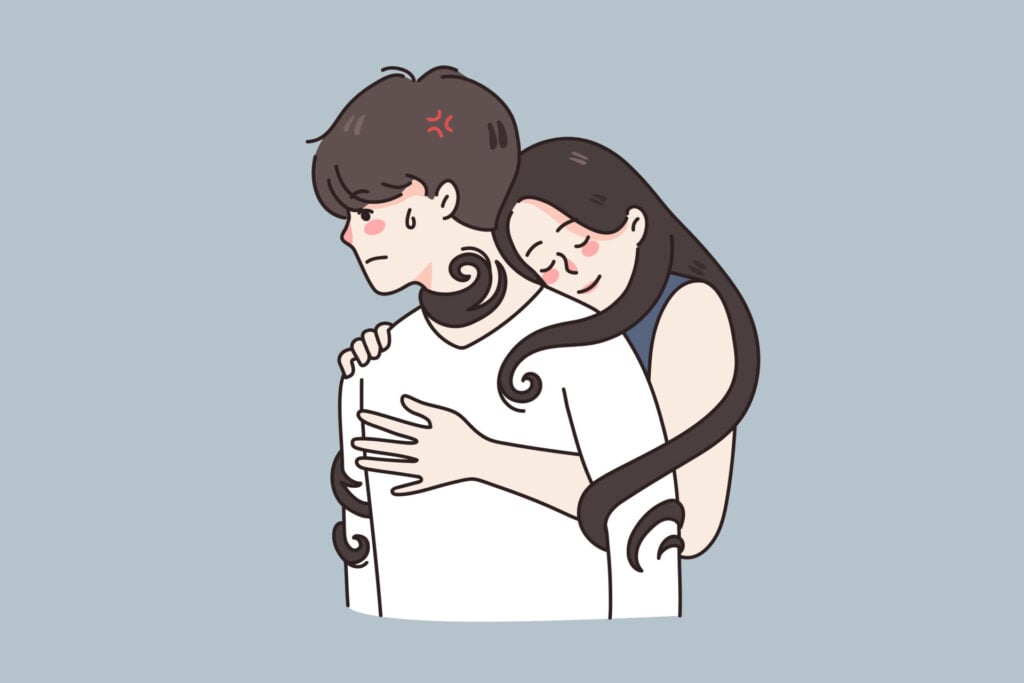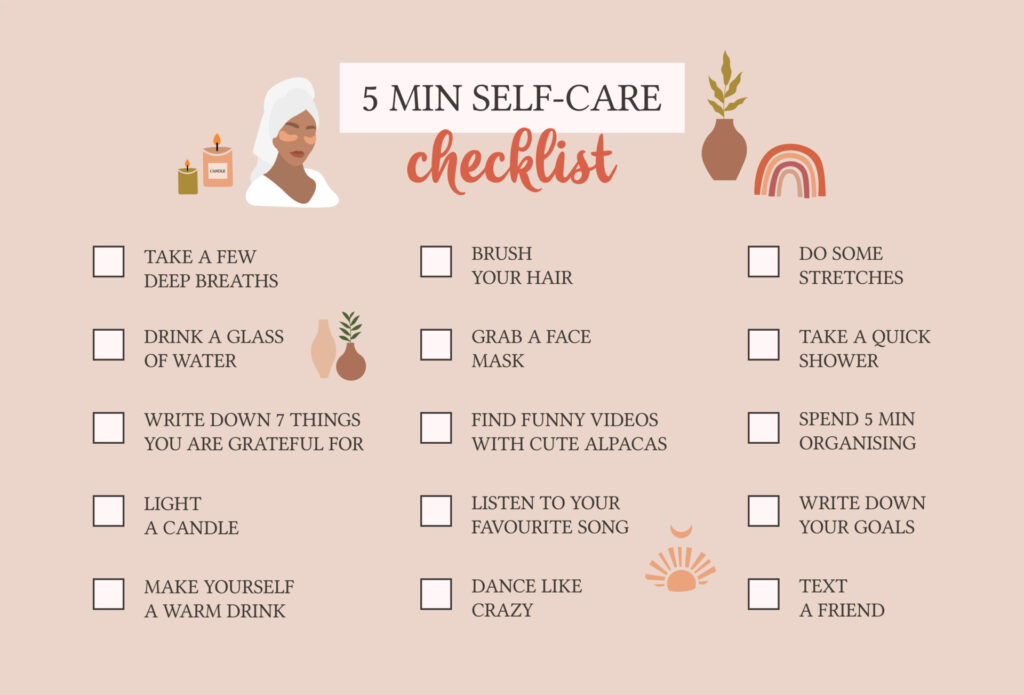Becoming less codependent in your relationships is an important step towards building healthier, more fulfilling connections with others.
Codependency often involves excessive emotional reliance on another person, which can lead to a lack of independence and a negative impact on your self-esteem.
The first step towards becoming less codependent is recognizing and acknowledging that you may have these tendencies. Take time to reflect on your past relationships and current ones.
Educate yourself about what codependency is and how it may manifest in your behavior. Identify patterns where you may have been overly reliant on your partner for validation, happiness, or a sense of self-worth.
Understanding the roots of your codependent patterns can help you address them more effectively going forward.

Am I Codependent?
As noted above, recognizing codependency in yourself can be a crucial first step in addressing and overcoming it.
Codependency is not a straightforward concept. It can manifest to varying degrees, and not everyone with codependent tendencies will exhibit the same signs.
However, there are some common characteristics that may indicate you are codependent.
First, you have trouble saying no to others and often find yourself doing things you don’t want to do to please or avoid disappointing them. You tend to put others’ needs and wants before your own, often neglecting your own well-being in the process.
You may feel responsible for others’ happiness, emotions, or well-being, even when it’s not your responsibility. As such, you might engage in people-pleasing behaviors to gain approval, avoid conflict, or ensure other peoples’ happiness, even when it goes against your own values or desires.
Codependent individuals also tend to struggle with a poor self-image. They have an intense fear of being alone or abandoned, so they seek external validation and approval to feel worthy or lovable.
All of these are signs of codependency.
Read through the following list of questions and take time to reflect on whether they apply to you. If you answer yes to most or all of them, this could be a sign you are codependent.
Please note, however, that this is only guidance and not a diagnosis – if you are concerned, you should speak to a trained professional who can conduct a proper assessment.
Consider whether the following statements describe you and your partner:
- Do you feel unable to live without your partner? In other words, does the thought of them leaving terrify you?
- Do you feel responsible for how your partner feels? For example, if you come home and they are upset, is your initial thought that it is because of you? And do you feel like it’s up to you to make them happy?
- Is it more important that others are happy? Would you rather other people be happy even if you are not?
- Do you feel more able to handle hardship than others and therefore feel you should take on others’ suffering?
- Will you go to great lengths to avoid conflict in your relationships, often at the expense of your own needs and desires?
- Do you find it difficult to say no to others?
- Are you afraid of speaking your mind or telling people your true feelings?
- Do you have few or no hobbies, interests, or activities outside of your relationships? In other words, is your identity heavily tied to the roles you play in others’ lives?
- Do you engage in caretaking behaviors like excessive worrying, monitoring, or enabling addictive behaviors in others?
- Do you feel detached from your feelings?
- Does it often feel like you have no idea who you are and what you want in life?
- Do you struggle to make decisions without other peoples’ input?
- Do you struggle to ask for help?
- Do you find it challenging to leave toxic or abusive relationships, even when you recognize their harm?
Steps towards Recovering From Codependency
Everyone should find their own path towards healing – there is no one-size-fits-all approach. Nonetheless, here are a few important steps than can help you become less codependent in your relationships:
1. Education
It is important to educate yourself on what co-dependency is and how it manifests in your behavior. Try to gain an understanding of what triggers your codependent tendencies. For example, it could be fear of abandonment, low self-esteem, or a need for control.
Identifying these triggers is the only way you can begin to work on them.
2. Reflect on Your Family of Origin
It is commonly believed that codependency often stems from growing up in a dysfunctional family of origin. Family dynamics and early experiences can play a significant role in shaping an individual’s behaviors, beliefs, and patterns of relating to others.
Therefore, to understand how your codependent beliefs, behaviors, and associated relational patterns have developed, reflect on your upbringing and early life experiences.
The following questions might be helpful to get you started:
- How was the relationship between you and your caregivers?
- Did you feel that your caregivers were emotionally or physically absent?
- Did they display codependent behaviors?
- Did you feel enmeshed or overly connected to your caregivers?
- Did you feel comfortable sharing your emotions and communicating your feelings and needs with your family members?
- Did someone in your family struggle with addiction or mental health issues? Was it your responsibility to take on the role of a caregiver?
- Was there frequent criticism, neglect, or abuse in your household?
- Did you ever fear being alone or abandoned by your caregivers?
3. Identify Patterns
People often unconsciously recreate familiar relationship dynamics from their childhood in their adult relationships. For example, someone who grew up in a family with an absent or emotionally distant parent might seek out partners who are emotionally unavailable.
This phenomenon is often referred to as “repetition compulsion” or “relationship patterns.”
Recognizing and understanding these patterns can be a crucial step in personal growth and creating more fulfilling, balanced, and positive relationships.
Awareness of unhealthy patterns allows you to make more informed choices, so you can avoid repeating past mistakes and make decisions that align with your values and long-term goals.
You can work on breaking destructive habits and replacing them with positive behaviors that promote your well-being.
One exercise you can try to uncover unhealthy patterns is to create a table with a column for each past relationship you’d like to reflect upon. Then, create rows with the following questions:
- How did the relationship start?
- What was your first impression of them?
- What attracted you to them?
- What was good about the relationship?
- What was bad about the relationship?
- How long did it last and how did it end?
- If you had the chance, would you get back together with them?
- What codependent features were present? (You can use the questions in the above section to answer this question)
4. Explore Yourself
A core feature of codependency is the suppression of one’s own needs, feelings, and desires, often to the detriment of one’s well-being and sense of self.
Recovery from codependency involves getting to know yourself better and learning to prioritize your own needs and desires.
What are your core values?
Your core values are the fundamental beliefs and principles that guide your choices, behaviors, and priorities in life. They represent what matters most to you and serve as a compass for decision-making.
You may not know exactly what they are right now, so take a little bit of time to reflect and consider the following questions:
- Who do you spend most of your time with?
- What do you spend most of your time doing?
- What gives you energy?
- What seems to be on your mind a lot?
- What do you enjoy talking about the most?
- What is most important to your family?
- Why do you do the job you do/ why do you study what you study?
What are your personal goals?
Take time to reflect on your values, beliefs, interests, and goals. Explore what truly matters to you and what brings you joy and fulfillment.
Do you have any dreams and hopes for your future? If there were no limitations, what would you do?
Journal and Reflect
Keeping a journal can be a powerful tool for self-reflection and self-discovery. Write about your thoughts, feelings, and experiences to gain insight into your true self.
5. Establish Boundaries
Boundaries are limits. They define what is acceptable and what is not.
People with codependency often struggle with boundary setting. I️t is important you learn how to set and enforce boundaries in order to maintain your independence and self-respect.
This means knowing your limits, communicating them clearly to others, and enforcing them when necessary.
Getting to know yourself better will help with boundary setting.
Ask yourself:
- What do you need and want from a relationship?
- What is your preferred communication style?
- What are some of the unhealthy aspects of your relationships? What would you like to avoid in the future?
- Where do you draw the line in terms of behavior and language?
- In your opinion, what is a healthy relationship? What does it mean to be an independent person?
Once you have established your boundaries, you can start to implement them. This might make you feel anxious at first, so it’s best to start small and work your way up.
Remember, the people who do not accept or respect your boundaries are the ones who benefit from you not having any.
Another important part of boundary setting is practicing assertiveness and learning to say no. Don’t feel obligated to agree to everything your partner asks. It’s okay to decline requests or set limits when needed.
You should not feel guilty for prioritizing your own needs and well-being.
6. Develop Your Independence
Having a life outside your partner can boost your self-esteem and reduce dependency.
Cultivate your own interests, hobbies, and passions outside of the relationship. By spending time apart, you are countering the idea that your well-being is tied solely to the relationship or your partner.
When you invest in your personal growth, hobbies, or other relationships, you are reinforcing your self-worth independently of your romantic relationship.
This helps you become emotionally self-reliant rather than looking for constant validation or emotional support from someone else. As you maintain your individuality, you will develop a robust sense of self that does not hinge on someone else’s presence or approval.
This will only make your relationship stronger in the long-run as you are cultivating a dynamic where two individuals can come together to share their lives, rather than to fill a void in each other.
A balanced level of independence frees both partners from the cycle of codependency, leading to a healthier and more sustainable relationship.
Self-care as quality time
The belief that taking care of oneself is selfish is an unhelpful and potentially harmful belief that can often develop as a result of early experiences, especially in individuals who struggle with codependency or have grown up in dysfunctional family dynamics.

It’s crucial to recognize the importance of self-care and understand that taking care of yourself is not selfish; it’s a necessary foundation for being able to care for and help others effectively.
Make sure you are prioritizing self-care routines that nourish your physical and emotional well-being. This can include eating well, getting enough sleep, exercising regularly, connecting with nature, or practicing meditation.
Healthy relationships require both self-care and care for others. Neglecting yourself can strain relationships because you can become resentful or overly dependent on others for your well-being.
7. Practice Compassion
Many people, especially those with codependent tendencies, often believe that they should endure suffering and take on others’ problems as a way to demonstrate their strength or worth.
However, it’s essential to recognize that asking for help is not a sign of weakness; in fact, it requires strength, vulnerability, and confidence.
Asking for help acknowledges that you have limitations, just like everyone else. It’s an acknowledgment that you cannot always handle everything on your own, and that’s perfectly okay.
Codependent traits and behaviors often develop as coping mechanisms in response to challenging and dysfunctional environments. Therefore, having compassion for yourself and understanding the origins of codependency is a crucial part of the healing process.
Self-compassion helps you let go of self-blame and recognize that your codependent traits are not your fault. They were adaptive responses to difficult circumstances.
8. Open Communication With Your Partner
Open and honest communication about your desire for more autonomy can be instrumental in reducing codependency and fostering healthier relationships.
First, it sets the stage for mutual understanding and respect. When you clearly express your need for personal space or pursuit of individual interests, it can lead to improved understanding, trust, and balance in your relationships.
Communicating your needs and desires helps ensure that both you and your partner have a clear understanding of what each person expects from the relationship. This clarity can prevent misunderstandings and conflicts.
For example, both partners may discover they’ve been relying too heavily on each other for emotional support, validation, or problem-solving. By sharing your desire for more autonomy, you allow your partner to understand your needs and support your personal growth in a more balanced way.
Additionally, communicating your needs and desires is an act of self-advocacy. It empowers you to prioritize your own well-being and assert yourself within the relationship.
This shift from an ‘us against the world’ mindset to a more balanced ‘two individuals in a partnership’ approach can be liberating as it helps break the cycle of codependency.
Take Your Time
Society drives us to always look for a quick fix for everything. It is important to remember that change takes time, and it’s okay to have setbacks.
Be patient with yourself and understand that becoming less codependent is a gradual process. Maybe keep a journal or engage in regular self-reflection to track your progress and identify areas where you still struggle with codependency. And, be sure to celebrate your successes along the way.
Julia Simkus edited this article.


